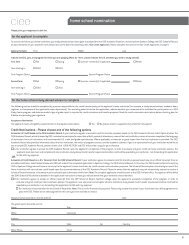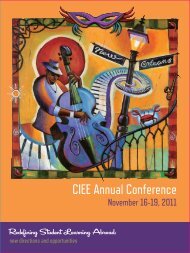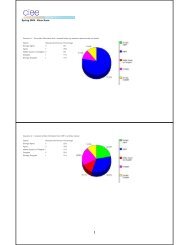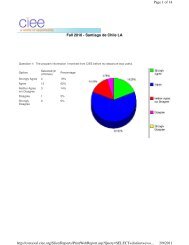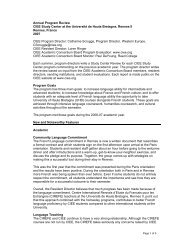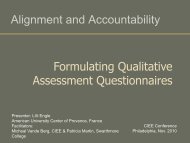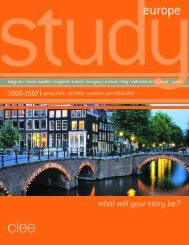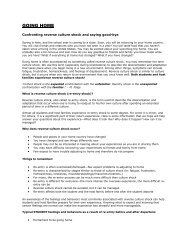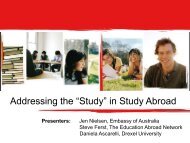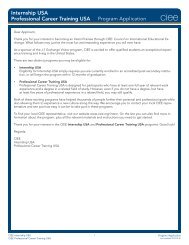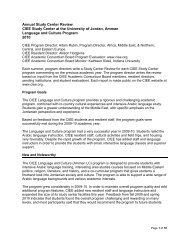botswana - Council on International Educational Exchange
botswana - Council on International Educational Exchange
botswana - Council on International Educational Exchange
You also want an ePaper? Increase the reach of your titles
YUMPU automatically turns print PDFs into web optimized ePapers that Google loves.
ec<strong>on</strong>omy, new wealth, advanced medicine,<br />
educati<strong>on</strong>, and the country’s first postal service.<br />
Prior to their independence, the Batswana<br />
lacked financial support from the occupying<br />
British government and they relied heavily <strong>on</strong><br />
the churches to educate their youth.<br />
In the 1890s, attempts were made to incorporate<br />
Botswana into the Uni<strong>on</strong> of South Africa under<br />
the tutelage of the British South Africa Company<br />
but Kgosi (chief) Khama III, Bathoen, and<br />
Sebele went to Britain to protest against<br />
incorporati<strong>on</strong>. They were aware of how brutal<br />
company rule was in places like Southern and<br />
Northern Rhodesia (Zimbabwe and Zambia) and<br />
they did not want to be subjected to the same<br />
treatment. C<strong>on</strong>sequently, in 1895, Queen<br />
Victoria decreed that Botswana was to remain<br />
under the protecti<strong>on</strong> of the British Crown. So<strong>on</strong><br />
railways and the installati<strong>on</strong> of the telegraph<br />
cauterized 20 th century development.<br />
The next development that had a significant<br />
impact <strong>on</strong> Botswana’s future occurred in Cape<br />
Town, South Africa in the 1960’s. Harold<br />
Macmillan’s ―Winds of Change‖ speech led to a<br />
peaceful and carefully negotiated deliverance of<br />
independence <strong>on</strong> September 30, 1966. Sir<br />
Seretse Khama was elected as the country’s<br />
first leader under a parliamentary democracy<br />
and Gabor<strong>on</strong>e became Botswana’s capitol city.<br />
So<strong>on</strong> after independence diam<strong>on</strong>ds were<br />
discovered and the present-day Botswana<br />
started to take shape.<br />
Gabor<strong>on</strong>e<br />
Gabor<strong>on</strong>e was selected as the capitol city of<br />
Botswana in 1966, after the country’s<br />
independence. It is the largest city in the country<br />
with an estimated 250,000 residents.<br />
Gabor<strong>on</strong>e’s close proximity to Johannesburg,<br />
South Africa opens many opportunities for easy<br />
travel, technological advancement, and<br />
commercial trade. When Gabor<strong>on</strong>e became the<br />
capitol, it was very small and mostly covered in<br />
brush. Its lack of ―modern‖ infrastructure turned<br />
into an advantage as the city could be designed<br />
from the ground-up. Today, Gabor<strong>on</strong>e is packed<br />
with office towers, shopping malls, and fast-food<br />
restaurants. For the most part, <strong>on</strong>e can find any<br />
western amenity desired within the city of<br />
Gabor<strong>on</strong>e.<br />
The city houses embassies for Angola, France,<br />
Germany, Namibia, South Africa, the United<br />
Kingdom, the United States, Zambia, and<br />
Zimbabwe. Many more countries have<br />
embassies or c<strong>on</strong>sulates that are located in<br />
South Africa.<br />
Gabor<strong>on</strong>e is c<strong>on</strong>sidered to be a very safe city<br />
with a low crime rate. Although uncomm<strong>on</strong>,<br />
petty-crime does still occur and visitors and<br />
residents alike should use comm<strong>on</strong> sense<br />
practices during their stay.<br />
Ethnic Identities<br />
In Botswana, all nati<strong>on</strong>als, regardless of ethnic<br />
identity, are called Batswana. About 50% of the<br />
populati<strong>on</strong> speaks Setswana, which is a nati<strong>on</strong>al<br />
language. English is the official language, as<br />
well as the prevalent language spoken for<br />
business and governmental affairs. The<br />
Bakalanga is the sec<strong>on</strong>d largest group and they<br />
tend to be more prevalent in Francistown than in<br />
Gabor<strong>on</strong>e. Other ethnic groups in the country<br />
include Batawana, Bangwato, Banwaketse,<br />
Bakgatla, Basarwa, Baherero, and Bayeyi.<br />
The oldest populati<strong>on</strong> is the Basarwa (often<br />
referred to as the ―San‖ or ―Bushman‖). In early<br />
history, they were hunters and gatherers who<br />
adapted successfully to the harsh and<br />
dangerous living c<strong>on</strong>diti<strong>on</strong>s of the Kalahari<br />
Desert. Today, the remaining 60,000 – 80,000<br />
Basarwa are struggling for recogniti<strong>on</strong> and their<br />
share of the natural resources. The Basarwa<br />
can still be found living in the Kalahari and many<br />
tribes are protected and supported by the<br />
Botswana government. Although seen as an<br />
important part of Botswana’s cultural identity that<br />
should be preserved, there is a movement to<br />
integrate them more into modern society through<br />
c<strong>on</strong>troversial relocati<strong>on</strong> efforts.<br />
YOUR HOST:<br />
THE UNIVERSITY OF BOTSWANA<br />
The University of Botswana was established as<br />
the country’s first instituti<strong>on</strong> of higher learning in<br />
1982. The University’s campus is the<br />
combinati<strong>on</strong> of two former universities: The<br />
University of Botswana, Lesotho, and Swaziland<br />
and the University of Basutoland,<br />
Bechuanaland, and Swaziland, both of which<br />
had campuses in Gabor<strong>on</strong>e.<br />
Currently there is a student populati<strong>on</strong> of<br />
approximately 15,000 and a staff of over 2,000,<br />
including over 800 academic staff. The<br />
University’s visi<strong>on</strong> is to be a leading academic<br />
center of excellence in Africa and the world. Its<br />
missi<strong>on</strong> is to improve ec<strong>on</strong>omic and social<br />
c<strong>on</strong>diti<strong>on</strong>s for the Nati<strong>on</strong> while advancing itself<br />
as a distinctively African University with a<br />
regi<strong>on</strong>al and internati<strong>on</strong>al outlook. The<br />
University’s values recognize a commitment to<br />
students, academic freedom and integrity,<br />
cultural authenticity, and internati<strong>on</strong>alism. It is<br />
5




